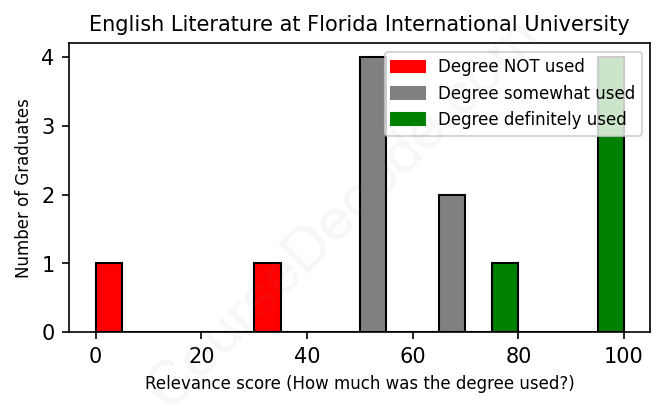
First, some facts. Of the English Literature graduates from Florida International University we've analyzed , here's how many have used (or NOT used) their degree in their career:

These are estimates based on AI analysis of 13 LinkedIn profiles (see below).
The verdict? Slightly below average. Overall, with an average relevance score of 64%, English Literature graduates from Florida International University have a slightly lower likelihood (-3%) of finding work in this field compared to the average graduate across all fields:
And for comparison, here's the chart for all profiles we've looked at across all degrees.
Also, after graduating, 38% of these graduates have pursued further education other than another Bachelor's degree (such as a Masters degree or other), compared to the average across all profiles of 35%. This suggests you may need more than just a Bachelors degree to be competitive as a English Literature graduate.
See the details:
|
Relevance score: 100% We think this person has gone into a career highly relevant to their degree. We think this person has gone into a career highly relevant to their degree.
DEGREE INFOGraduated in 2017 from Florida International University with a Bachelor of Arts - BA in English Literature. No other secondary education since. JOB HISTORY SINCE GRADUATIONTechnical Writer Allay Pharmaceuticals, LLC Aug 2017 - Jun 2018 Content Writer  OnPoint Jul 2018 - Nov 2019 ABOUTI started working at Allay Pharmaceuticals during my last semester as a student at Florida International University, and during that time I honed both my professional and academic writing skills. I worked as a server at Bonefish Grill for 3 years and the interpersonal and communication skills I exercised at that job remain just as useful to me in any career field I venture into. |
The top 10 most common jobs done by the graduates we've analyzed (ranked most common to least) are:
When you take a look at the job paths of people who graduated with an English Literature degree from Florida International University, it's pretty interesting to see a mix of roles. A lot of them have landed jobs that are directly tied to their studies, like English teachers, editors, and writers. These positions highlight the skills developed during their degree—things like understanding language, crafting narratives, and critical analysis are all super useful in those fields. However, there’s a noticeable number of graduates who took on roles that don't really relate to English literature at all, such as front desk clerks, admissions advisors, and office assistants. It's clear that while some graduates found ways to apply their literary skills, others found themselves in jobs that are more about general communication or administrative tasks.
Overall, the trend shows that while there are definitely common threads linking many graduates to jobs deeply rooted in literature and writing, a significant portion have diverted to roles that don’t utilize their English Literature education directly. It’s a bit of a mixed bag; while some people are fully embracing their literary skills, others seem to be using more generalized skills that they picked up along the way. This combination might reflect the versatility of an English Literature degree—it's valuable in a variety of settings, but it doesn’t always lead to jobs that scream “literature!” It really depends on where your interests lie and how willing you are to chase after those literary opportunities.
Here is a visual representation of the most common words in job titles for English Literature graduates (this is across all English Literature graduates we've analyzed, not just those who went to Florida International University):

When looking at the career trajectories of graduates from Florida International University who studied English Literature, it’s clear that there’s quite a mix. Right after graduation, many seem to land jobs that may not directly relate to their degree. For instance, some started off as front desk clerks or in various administrative roles. However, as time passes, it appears that a portion of these graduates eventually finds their way back to careers more closely aligned with their studies, such as becoming editors, copywriters, or teachers. While initial jobs might not scream "literature lover," those early experiences often provide valuable skills that help them transition into roles that capitalize on their writing and communication talents.
If we fast forward five to ten years, we can see a more promising picture. Many graduates have moved into substantial positions, including teaching roles, legal careers, and even higher-level editorial positions. There are also some who ventured into marketing and social media management. It seems that as they gain experience, graduates are able to leverage their degree in more meaningful ways, finding niches that utilize their English skills. Though some may find themselves in jobs that feel unrelated initially, the flexibility of an English Literature degree helps carve out diverse career paths. Overall, while the start may be rocky for some, many graduates do find fulfilling careers related to their passion for literature and communication as they gain experience.
Honestly, getting a Bachelor’s degree in English Literature, whether at Florida International University or elsewhere, can be a mixed bag in terms of difficulty. On one hand, if you love reading and diving into different pieces of literature, you might find it pretty enjoyable and manageable. You'll be analyzing texts, writing essays, and discussing themes, which can be fun if you’re into it. However, it can also get challenging with the amount of reading and the critical thinking required, plus some professors might have higher expectations than others. Overall, many students find it to be a bit easier than more technical degrees, but it still requires a lot of effort and engagement. So if you're passionate about stories and literature, you might find it more of an adventure than a struggle!
Most commonly, in the LinkedIn profiles we've looked at, it takes people 4 years to finish a Bachelor degree in English Literature.
Looking at these graduates from Florida International University, it seems like they've had a pretty mixed bag when it comes to making decent money. Some of them have clearly moved into roles that likely pay better, especially those who ventured into specialized positions like teaching, legal work, or content creation, where salaries can trend higher. For example, the graduates working in legal fields or as advertising copywriters probably have better earning potential compared to those in entry-level or temp jobs like bookstore clerks or office assistants. Overall, it looks like while some of these grads have secured stable and potentially lucrative positions, others are still in those early roles that may not be raking in the big bucks just yet. So, it kind of depends on the path they chose after graduation!
Here is a visual representation of the most common words seen in the "about" section of LinkedIn profiles who have a Bachelor degree in English Literature (this is across all English Literature graduates we've analyzed, not just those who went to Florida International University). This may or may not be useful:

Here are all colleges offering a Bachelor degree in English Literature (ordered by the average relevance score of their English Literature graduates, best to worst) where we have analyzed at least 10 of their graduates: